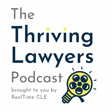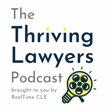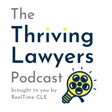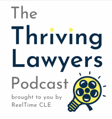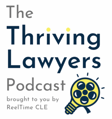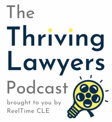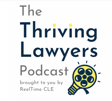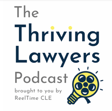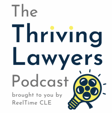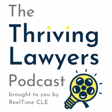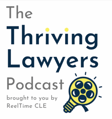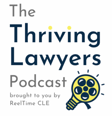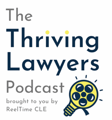Become a Creator today!Start creating today - Share your story with the world!
Start for free
00:00:00
00:00:01

Prof. Shailini George, who IS The Law Student’s Guide to Doing Well & Being Well (Pt. 2)
In this week's episode, join Michael Kahn for part 2 of an enlightening and hopeful interview with Shailini Jandial George, Professor of Legal Writing at Suffolk University Law School. Stay in Shailini George's loop >> https://www.suffolk.edu/academics/faculty/s/j/sjgeorge Twitter: @ShailiniG Instagram: lawyer_wellbeing
Transcript
The Value of Small Human Connections
00:00:00
Speaker
I make the recommendation in my book like if you don't have a dog offer to walk your neighbor's dog like your neighbor will like that and you'll still you know you'll still have this opportunity so they can be small connections that can be having a conversation with
00:00:13
Speaker
the person who makes your coffee or someone at the grocery store. All of those human connections are really important. Going back to our overuse of phones, if you have your nose buried in your phone all the time, you miss the opportunity to have even those small connections. That's a message I've really
00:00:35
Speaker
for years have been really trying to get out. So the phones are bad for us in so many ways. This is just another example.
Introduction to Shalini George's Well-being Course
00:00:45
Speaker
Welcome back to The Thriving Lawyers Podcast. In this week's episode, join Michael Kahn for an enlightening and hopeful interview with Shalini George, a professor of legal writing at Suffolk University Law School. The thing that we haven't talked about is that I'm actually teaching a pilot course at Suffolk this semester, actually this year.
00:01:04
Speaker
Called preparing for professional success and that is really very specifically meant to be a well-being course and I've had the joy really of working with some students We've used my book and we've used a lot of other resources from positive psychology and elsewhere Wow
00:01:26
Speaker
to have the opportunity to talk about these things in an academic environment. And is this something you've already done, or this is something you're preparing to do? Doing. Doing. Doing. Yeah, it's this academic year, so we started last fall.
00:01:43
Speaker
It's just a pilot, so in fact tomorrow I will be reporting to my faculty about the results and asking for the pilot to be expanded and continued next year.
Using Positive Psychology for Student Success
00:01:56
Speaker
So it's a big step and there are I'd say 15 or 20 schools around the country that have some sort of class along these lines. I think a lot of schools are trying to figure out
00:02:08
Speaker
How do you get these topics? I would love to see that if you're, I don't know if you're allowed to, but I would love to see the syllabus for that program. I'd be really curious to, because all the stuff we're talking about here can, lawyers can use. Folks are out there practicing. This is all not limited to law school by any means. So I'd love to see what you're teaching them. That's fantastic.
00:02:35
Speaker
Yeah, it's been an interesting experience. And like I said, so we used my book. So you have an idea. First semester, it was mostly the chapters. Your book was the textbook? Yeah, Suffolk very generously donated or gave the students who volunteered to take this class a copy of my book. That was part of their incentive. They're not paying tuition for it. And they have volunteered to take this extra credit class.
00:03:04
Speaker
So, we used my textbook and then this semester we've been a little bit more focused on, so we had the first class of the semester was about processing bad news, or, you know, because they had gotten their grades and we talked about, you know, what have we learned first semester and how do we translate that, you know, taking these grades into approaching certain things differently second semester.
Modeling Resilience and Vulnerability to Students
00:03:27
Speaker
I had a class on networking. I had my students practice networking. Go back to that just for a second, the processing bad news. That's intriguing to me. You talked to them about how to process bad news, how to cope with it.
00:03:44
Speaker
yes respond to it how you work through it all that yes yep wow how to take positive that is not that is not what most of us in law school leaves my uh none of us none of us michael had this kind of stuff in law school um it's really been it's been really interesting like i knew that this was something that i wanted to talk to them about i learned so much this year from them because the the primary work that they do for the class is journal writing
00:04:14
Speaker
So I had had a sense, because I teach first-year students and I teach a required first-year course, I certainly had a sense that particular times of the year stress them out more than others, that they were worried about getting a grade on their first legal writing memo. I knew these things intrinsically, but in this new course that I was teaching this year, I was actually reading. They weren't my legal writing students. We made sure that I didn't have my own students in my class.
00:04:42
Speaker
other, you know, they're in other legal writing courses, I'm reading them their journal entries when they're getting these grades. And they're thinking, Oh, my gosh, you know, they're writing things like, Oh, my gosh, I don't know, I'll never get a good grade. I don't know if I can make it. I don't know if I can do this. I can't believe I got a, you know, whatever. And so I had the opportunity to just kind of help them process through it. I don't know if you read if you got to the part in my book, or I reveal that I got a very bad grade my first year in law school.
00:05:12
Speaker
Tort was a torts class. Yeah. Yeah. Yes. I did. I did that was I think the resilience chapter. I think yeah Right. So, you know, I gotta see and you can share that. Yeah I mean I put it in the book. So obviously I'm willing to share it I will tell you the story that somebody who read Was reading for me as I was writing said are you sure you want to say that? I mean, do you want to just say you got a bad grade? And I said I'm gonna say it because if I say I got a bad grade people will think I mean I gotta be
00:05:43
Speaker
And I think it's important for everybody to recognize that we can we can get past these setbacks. So, you know, they students had read right that I got to see in torts. And so it's not me some professor who's never had to struggle with with anything
00:06:00
Speaker
standing up at the front of the room and saying, you'll be fine. I could actually say, yeah, this was really tough. I questioned my decision to go to law school. I questioned whether I was smart enough or what was I doing wrong, but here's how I learned from it. I learned I had a real issue with multiple choice questions and I knew I had to fix it because I was going to have to take a bar exam and here are the steps I took.
00:06:25
Speaker
So I know. That's great. By the way, all of your teaching sounds fantastic. And that lesson is as important as everything else you've talked about, just modeling vulnerability to students and modeling imperfection.
00:06:47
Speaker
because that can be such a big issue for lawyers. That whole idea about perfectionism. And I know in the book you talk about the growth versus fixed mindsets, which is relevant to all this too. The idea that a lot of people, but lawyers in particular, have this mindset that they're a fixed product. They're all done. There's no more work to be done on them at all.
00:07:15
Speaker
Versus growth which is yeah, I'm gonna make mistakes and learn from them and that can be a real Important shift in mindset, right? Yeah topic, but I think it's all related to what you're talking about Absolutely. There's that This idea that that they sometimes think everybody else gets it better than they do or gets it easier than they do so those are things that we talk about in this new class and
00:07:40
Speaker
I think they appreciate hearing from the other students like, no, I really struggled with that too. They tell me that they're able to be vulnerable in that class in a way that they just can't obviously anywhere else in law school. So I do think that's...
00:07:56
Speaker
is a valuable thing. And they think that, you know, everybody else is so smart, you know, that's that fixed mindset. And it's, it's good to be able to talk to them about various I mean, I've had, I've had struggles, I've had lots of struggles, and I don't mind talking about them. They've made me you know, they've gotten me to where I am, maybe maybe I would, my life would have taken a different turn if I had handled something differently. So I think there's no right or wrong.
00:08:24
Speaker
but we have to recognize that there's something that we can take and learn from all of those setbacks. So I'm learning from these students too. I mean, that's the really fun part. Yeah, yeah, for sure. As a therapist, I'm always learning from my clients. That's not the goal, of course. Yeah. But you just can't help but learn from folks and they're just hearing their stories and how they have
00:08:53
Speaker
Their resilience certainly is something I can gain from as well. It sounds like you do too. I do. There are some things in the book I want to go to also, we've already spoken about some of these things, but I really, you talk about how important it is, this is in the resilience chapter two, to build and cultivate social connections. Right. And that's something I also particularly
00:09:23
Speaker
COVID has made it worse, that folks are more isolated, and lawyers can tend to be isolated back to what we just said. They're not being vulnerable or feeling like they're the only ones so they can't share that they've made a mistake. Or with younger lawyers, they can definitely
00:09:49
Speaker
believe that it's not in their best interest to share the stakes or vulnerability,
Post-Graduation Challenges and Maintaining Connections
00:09:55
Speaker
right? Do you, speaking of that, younger associates, do you talk to, do you have contact with students who have graduated and who are practicing? And I'd be curious to hear about that. Yeah, I do. I have some wonderful students who keep in touch with me after they graduate.
00:10:18
Speaker
Mostly what I hear from them is about their legal writing. They like to tell me how well, you know, all the compliments. Yeah. They like to relay all the compliments they get on their writing. But yeah, I do hear from students that it can be a sort of a rude awakening at various times when they realize that they
00:10:43
Speaker
they're not going to go to their boss and say, gosh, I'm feeling kind of down today. Or I'm not really, I'm not loving what I, what I have, the kinds of conversations, unfortunately, that I have more than anything else are students who come back to me and say, I'm not loving what I'm doing. And I'm trying to figure out what else I might like to do. And the fact that I have those conversations is part of what inspires me, I think, to be involved in this work.
00:11:12
Speaker
And it kind of goes back to, I think, something I said at the very beginning, which is nobody is coming to law school feeling like, gee, I hope I burn out in a few years. I really hope that I have a serious mental health issue. But that's what I end up seeing. And that's part of what motivates me, I think, has motivated me to become so involved in this kind of work. Because I do see that.
00:11:38
Speaker
So you asked about social connections. I think the connection even between a student and a professor that goes beyond the law or the specifics of a class, even that connection is something that can help students through some of these tougher times. Absolutely.
Social Isolation and the Importance of Connection
00:11:56
Speaker
I actually stayed connected with
00:11:58
Speaker
Actually, coincidentally, my legal writing professor from law school. He also taught property. He was an associate dean of the law school and we became good friends. He became good friends with some of us. We actually would go on and enter softball tournaments for law schools and then for alumni law school softball tournaments.
00:12:26
Speaker
He was a great resource for me up until, sadly, he passed away a couple of years ago. Well, I'm sorry to hear. That's one of the great things about legal writing is that that's one of the courses that's smaller. And so we do get to know our students. I think that's one of the issues. I think you said earlier about how the first year is a particularly tough time. I just had one of my students in my office the week before last
00:12:55
Speaker
who was emotional. I think it surprised her that as she was talking, she became emotional. I found that mostly what I was saying to her is, you just have to get past this year. I promise it will be different if you get past this year. Why do we have to say things like that? Why can't we think about changing that first year experience just a little bit?
00:13:18
Speaker
The connections are really important, even if it's walking your dog. I mean, I use dog walking in a lot of my examples because I walk my dog a lot and I love seeing people and neighbors and dogs. And you're preaching the choir here, I love dogs. And dogs also, they help you connect with people too. They do.
00:13:44
Speaker
Do people see your dog and then want to ask you questions about kind of dogs? Can I pay your dog? Super easy way to make friends. Yeah. Yes. And you see people, I loved my dog. Don't mean this to be a, don't mean this to be a podcast about loss, but our dog passed during COVID. So that's something I'm really missing because one of the things I'm noticing is of course missing her, but
00:14:10
Speaker
But missing the connection I make with people through her. I make the recommendation in my book, like if you don't have a dog, offer to walk your neighbor's dog. Your neighbor will like that and you'll still have this opportunity. They can be small connections. It can be having a conversation with the person who makes your coffee or someone at the grocery store. All of those human connections are really important.
00:14:39
Speaker
going back to our overuse of phones, if you have your nose buried in your phone all the time, you miss the opportunity to have even those small connections. And that's a message I've really, for years, have been really trying to get out. So the phones are bad for us in so many ways. This is just another example. Agreed. Yeah. So go ahead. Were you going to say something else?
00:15:07
Speaker
The only thing I was going to say is that when I didn't say this earlier, when you asked me how I got into teaching or about my career path, but when I decided I wanted to teach, I
The Need for Self-Compassion in the Legal Profession
00:15:17
Speaker
reached out to my legal writing professor. She's the one who I took her out to lunch and she gave me a few very good pieces of advice and kind of pushed me in the right direction. So I think those connections, as we said, they stay with us.
00:15:34
Speaker
So you have some other things and we've got a few minutes left and I definitely wanna give you time at the end to share anything I haven't asked you about. I'm really intrigued with that course. So I'd love to stay connected with you after this, after this podcast to learn more about that course you're teaching, because that's fascinating. But there's some things in the book I just wanted to, that I think are important
00:16:02
Speaker
And I wanted to put out there and see if you want to speak any more to them. One was self-compassion. You mentioned that in your book. And would you like to expand on that topic? Sure, sure. I think we're all so hard on ourselves. And the practice of law requires, I think, so much emotional work sometimes that if we don't take care of ourselves, I think it's very hard to be there for clients.
00:16:31
Speaker
And I think that's another thing that can lead to burnout so easily. I think I give the example in the book of one of my children who's very hard on himself. So we have to change the way we talk to ourselves. And I just think that's something that takes a lot of practice. I think the personality of people who come to law school, we touched on this a little bit in the fixed mindset.
00:16:59
Speaker
There's also, and we talked about perfectionism, there's this drive I think that people have when they come to law school. They've been successful before and they need to be successful in law school and it's very hard to recognize that maybe if you've always been an A student before and you're not quite an A student now that that doesn't mean you're not smart or that you're not going to make it in the law. But we're very quick to take small setbacks and make them really big in our head.
00:17:27
Speaker
And we're very reluctant to take small victories and make them bigger in our head. So I just try to have those kinds of conversations with my students in this new course in particular, but even in my legal writing course, to try to emphasize that point, that don't float past the good news to focus only on the bad news. I think it's human nature, and you probably know this more than I do,
00:17:55
Speaker
that as humans, I think we tend to do that. So it's something that we have to actively work on and fight against. And lawyers even more, the law students are trained to do this, and lawyers even more so to issue spot, right? And to look for... On the adversarial system and...
00:18:12
Speaker
All of that is there's winners and there's losers and the Socratic method. I mean, there's certainly a laundry list of things about people who go to law school and about the law school environment that I think brings that out even more and thus the need for self-compassion even more.
Reconnecting with Career Goals and Finding Happiness
00:18:32
Speaker
You also mentioned in your book the importance of having a sense of meaning in your life and I guess in terms of
00:18:43
Speaker
what you do work-wise. Did you want to expand on that a little bit? Sure, sure. So this is a topic that actually we have spent a significant amount of time talking about in my new class. And I think it's really important, again, in the first year of law school. So we have sometimes these grand ideas and goals about why we want to go into law. And you have this image of yourself
00:19:10
Speaker
maybe as a prosecutor or a public defender or working for legal aid or whatever your dream job is. And then you hit the first year of law school and you forget that that was your dream because it's contracts, property, torts, you know, con law, the curve, the Socratic method, like all of those things that we've talked about. And so one of the things that we try and do in this new class is take students back to those original goals. Like what was the idea of what you wanted? What is it you dreamt of doing?
00:19:40
Speaker
And how can we connect you back to that original place and meaning? So that's one thing. The other thing is just we talk generally. There's a great TED talk that somebody clued me into in which I had my students watch this year about happiness and how chasing happiness is never going to make you happy. So we kind of have been able to have this talk. It's so helpful to me too.
00:20:07
Speaker
that if you always think that there's this one thing that's going to make you happy, if I get an A in contracts, then I'm going to be happy. If I get this internship, I'm going to be happy. And it never makes you happy because you move on to the next thing. So thinking beyond what those
00:20:26
Speaker
small goals or ideas are and trying to link our our efforts and our time in law school back to that bigger meaning that we thought about you know that got us to law school or that that motivated an interest in the law that can help and that can really help in processing bad news and things too because you can you can
00:20:48
Speaker
put it in the box it needs to be in so that you can keep moving forward with learning about the law and getting towards that place that you originally dreamt of in thinking about a career in law.
Mindfulness and Loving-Kindness Meditation
00:21:01
Speaker
And that brings us back to mindfulness too. Yes. As far as happiness is concerned, rather than being attached to a thing or an event to
00:21:15
Speaker
to be mindful day to day moment to moment of the things that impact you in a good way or make you happy or content in some way. Right. Absolutely. One of the things so I did a mindfulness course myself last summer when I had some time and one of the things that really has stayed with me whenever I do something like that is kind of is the loving kindness meditation.
00:21:42
Speaker
where you think of someone or something that makes you feel unkind or that has given you trouble and you turn that conversation around. You try to understand where that person or thing is coming from and you meet it with love or kindness. And it sounds
00:22:02
Speaker
It sounds trite and yet it can be incredibly powerful. It just helps one recognize just how powerful our own minds and bodies are and how much we can turn that conversation around. And you mentioned in your resources section, I want to mention him too. Sadly, he
00:22:24
Speaker
past a few weeks ago, Thich Nhat Hanh. You have a couple of his books in your bibliography and your book, The Miracle of Mindfulness. And you are here. And I would highly recommend he's written, I can't even tell you how many books he's written. So those are two of them. And he's written so many more. Some are specifically on a topic like anger. But I just wanted to acknowledge that you
00:22:54
Speaker
have referred to him in your book and that he's somebody I wanted to mention here as well. He's a very relatable and yet so incredibly wise. So I find he's easy to read and easy to connect with.
Exercise as a Stress Reliever
00:23:11
Speaker
So you've already mentioned some of the things that you do, but are there any other things that you would say you do that help you manage your stress?
00:23:24
Speaker
or help you focus on those areas, those dimensions that we mentioned earlier in the Wellbeing Task Force graphic. What are some other things that are helpful for you? So that's actually an easy question for me, Michael. My number one stress relieving activity is exercise. I am just a huge proponent of exercise in whatever fashion one enjoys exercising.
00:23:54
Speaker
I have been working with my students on this too where they keep a physical activity log and we talk about the very many ways in which movement is helpful. So, you know, going back to those dimensions of well-being, I try to focus a lot of my conversations when I do workshops or guest lecture or talk to groups on intellectual well-being and physical well-being because
00:24:20
Speaker
It's easy to convince law students or lawyers that they should care about their intellectual wellbeing. That is their ability to perform their work as lawyers. It's very easy for me to get an audience to want to listen to ways in which we can improve that. It's improved in part by physical exercise. And so it's like this win-win situation, right? Where you're taking care of your body by exercising, but you're also taking care of your mind.
00:24:46
Speaker
And the connection between mind and body is so strong and so powerful. You know, we think with our bodies too. And so by connecting those two topics really explicitly and helping people see why devoting an hour a day or 45 minutes a day, even when you're super busy or you just feel like you don't have time, you know, it sometimes is the first thing people will give up.
00:25:12
Speaker
but it's counterproductive. It's counterproductive to mental productivity. It's counterproductive to our physical health. It's counterproductive to mental health. So I say in the book, and I very much believe this, that exercise is something, one of the few things in life where it may feel like a chore when you start. But once you devote yourself to it, it is this amazing joy and it is something that pays you back, you know, exponentially.
00:25:36
Speaker
in terms of brain, body, physical, mental health. And including movement throughout your day, too.
Incorporating Movement into Education
00:25:44
Speaker
Yeah. I agree with you on the exercise. I went jogging this morning. But doing some kind of movement throughout your day, and it can be just getting out of your chair and stretching or walking from your office to the
00:26:02
Speaker
Restroom, right? We're taking the stairs. We're going outside. We're taking the stairs. Taking the stairs. Absolutely. I mean, all of that. In fact, one thing that you might appreciate, my partner is a, she's a PhD student here, and she teaches as well. And she always incorporates movement in her class. It's the classes, it's in the School of Education, so movement isn't necessarily part of the syllabus.
00:26:29
Speaker
Yes, but but she always incorporates some kind of movement exercise in the class and also mindfulness Can you can you picture this Michael and my legal writing class and in my new class the preparing for professional success? I on the day that I was going to have them do the deep focused work before that I actually I
00:26:50
Speaker
had them stand up and I put some music on and I appointed a leader and somebody just marched the whole class around the room for a few minutes before we sat down to work. And yeah, sometimes they look at me like she is really crazy, but they can feel the effects. They can feel the effects of it. So that really is my number one for me stress reliever because I know it's doing so many good things for me.
00:27:19
Speaker
And I have had my many ups and downs myself as I was writing this book. Just a lot of personal, a lot of personal setbacks and exercising, going to the gym, seeing my friends at the gym, going for a run, breathing fresh air, going for a walk, walking my dog, all of that I firmly believe is what helped me get through some of the really tough times that I had.
00:27:48
Speaker
And being outside, being in nature, there's research that shows that being away from cars, away from roads, being in nature, you don't have to be the top of Mount Everest.
Nature's Impact on Mental Focus
00:28:02
Speaker
Just put yourself in an area walk where there's trees and greenery. That can, in one research study,
00:28:13
Speaker
I indicated that it reduced that part of the brain that ruminates. Yes. So it reduces rumination and anxiety. Have you read about this thing called attention restoration theory? Art?
00:28:25
Speaker
It's called, um, I don't know. Tell me about it. I, I read about that issue, but I've never heard of that acronym. Yeah. It's called, it's called capital A R T attention restoration theory. And the idea is that, you know, we have a limited amount of focus really available to us in a day. So four hours may be of deep focus, but one of the ways that you can replenish your attention is by going out in nature.
00:28:53
Speaker
Not just any nature though. So there was a study that was done and they took some students, two groups of students and they were going to have them do some memory and concentration tasks. But they sent one group of students to walk through, this was in Ann Arbor, Michigan, to walk through nature basically for 20 minutes. They sent the other group of students to walk through the city for 20 minutes. And the group that walked through nature
00:29:18
Speaker
performed better on the memory and concentration tasks after their walk than the group that walked through the city. So it wasn't just being outside. It was being able to be free from thought and focus. So the group that was walking through the city still had to kind of navigate crosswalks and traffic and people and things that caught their attention. Whereas being out in nature, where you genuinely are just breathing in the air, admiring the flowers, listening to the birds,
00:29:48
Speaker
that is gonna replenish your attention resources in a way that allows you to produce or to be more productive when you go back into work. That's great.
00:29:59
Speaker
Yeah. And then they did it again because they thought maybe it was just a really nice day or something. They actually sent one group out like in the dead of winter and they still performed better. So it wasn't weather related or anything like that. It's just the ability to let your mind rest that will give you that focus. Yeah. Attention restoration theory? Attention restoration theory. Yep. Okay.
00:30:24
Speaker
Well, I want to give you a moment where we're at the end of a very quick interview, at least my experience was quick. Is there any last thing you want to say before we wrap our discussion today?
00:30:42
Speaker
Um, you know, we've, we've really covered pretty much everything. Michael, the last thing I will just say is that, you know, the American bar association has recently passed some new standards for law schools, which, which are encouraging law schools, not encouraging. They're actually going to be requiring law schools to think about something called professional identity formation.
ABA Standards on Well-being in Law Education
00:31:03
Speaker
And under that they include instruction on wellbeing practices.
00:31:07
Speaker
So I'm really hopeful that courses like mine and other courses that I know people are working on will become more commonplace. And so I appreciate the opportunity to spread the word a little bit. And if anybody would like to contact me for more information or to kind of put our heads together. Give your contact info if you'd like.
00:31:33
Speaker
Sure, my email is the best way to get in touch with me. It's sgeorge at Suffolk.edu. Suffolk is spelled S-U-F-F-O-L-K. S-U-F-F-O-L-K, that's correct. I'm also on LinkedIn, and I've connected with some people on LinkedIn who I've been sharing information with. But between the different organizations that we talked about my involvement in and what I'm doing at Suffolk, I'm really working hard to collect and disseminate as much of this as we can.
00:32:03
Speaker
because I think law students and lawyers really need it. And we'll give, offline I'll get all of that contact information, email, social media, and we'll put that in the description of the program as well. Thank you so much for joining us today, and thank you listeners for coming back and listening to The Thriving Lawyers. Hopefully you'll be back again soon.
00:32:33
Speaker
Thank you so much. Bye-bye.
00:32:52
Speaker
The Thriving Lawyers Podcast is brought to you by Real-Time Creative Learning Experiences, a national provider of continuing legal education and professional development programs that leave participants engaged, encouraged, and equipped to pursue meaningful and sustainable change in their practices, their lives, and the organizations they work in. And by Osborne Conflict Resolution, your experience guides through the uncharted terrain of business and family law disputes based out of Charlotte, North Carolina. Thanks for listening, and we'll see you next time on The Thriving Lawyers Podcast.
